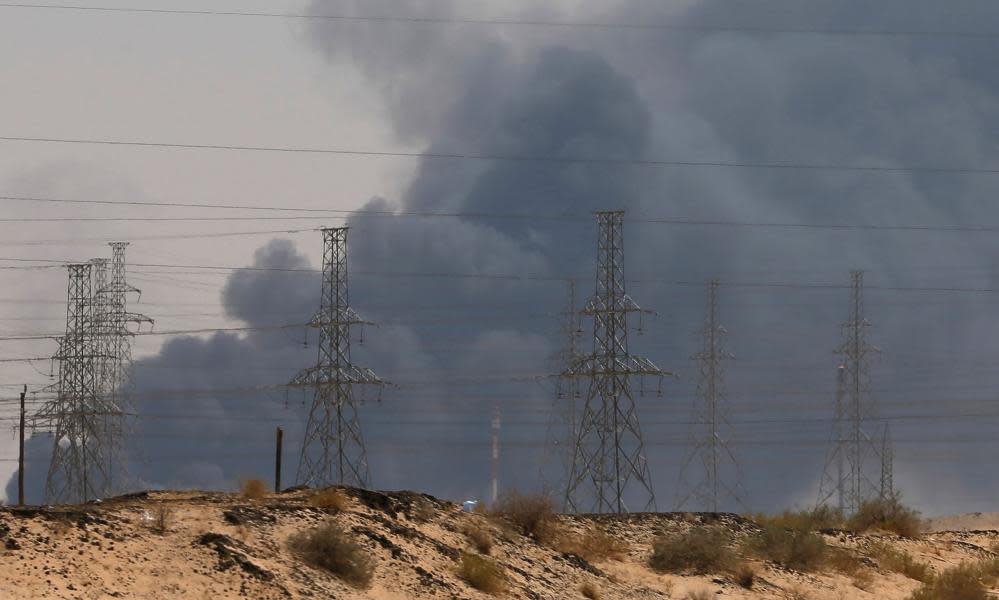Pompeo: Iran behind attack on Saudi oil facilities that will reduce kingdom's output

The US secretary of state, Mike Pompeo, has accused Iran of being responsible for attacks on Saudi oil plants that could lead to the temporary loss of more than 5% of global oil supply.
Iran-aligned Houthi rebels in Yemen claimed responsibility for Saturday’s drone attack. But Pompeo, Donald Trump’s top diplomat, blamed the attacks squarely on Iran writing on Twitter that there was “no evidence the attacks came from Yemen”.
“Amid all the calls for de-escalation, Iran has now launched an unprecedented attack on the world’s energy supply,” Pompeo said.
Related: Major Saudi Arabia oil facilities hit by Houthi drone strikes
“Tehran is behind nearly 100 attacks on Saudi Arabia while [President Hassan] Rouhani and [foreign minister Javad] Zarif pretend to engage in diplomacy,” he said.
According to a statement from the state-run oil producer Saudi Aramco, the attacks on the Abqaiq facility will cut the kingdom’s production by about 5.7m barrels a day, more than half of Saudi Arabia’s output. Saudi Arabia is the world’s largest exporter of crude oil.
The US energy department said on Saturday it was ready to release oil from its strategic petroleum reserve (SPR) if needed.
“Oil prices will jump on this attack, and if the disruption to Saudi production is prolonged, an SPR release … seems likely and sensible,” said Jason Bordoff, founding director of the Centre on Global Energy Policy at Columbia University in New York.
It is too early to know the extent of the damage to the processing plants and the Saudi supply chain that brings crude from oil fields to export facilities. The chief executive of Saudi Aramco, Amin Nasser, said in a statement that the company would have more information within 48 hours, as it works to bring back the lost output.
On Saturday, before Pompeo’s tweet, the White House said Trump had spoken to the Saudi crown prince, Mohammed bin Salman, “to offer his support for Saudi Arabia’s self-defense”.
The attack comes as tensions have been rising between the Washington and Tehran, after Trump withdrew the US from a nuclear deal between world powers and the Islamic Republic.
Iran has restarted some uranium enrichment in violation of the 2015 nuclear accord and the US has imposed sanctions. But Trump has recently held the door open for nuclear talks to begin, perhaps on the sidelines of the United National general assembly in New York later this month. Pompeo said such talks could take place without any preconditions.
Amid all the calls for de-escalation, Iran has now launched an unprecedented attack on the world’s energy supply
Mike Pompeo
Saudi Arabia, a US ally, backs the Yemeni government in a brutal civil war which began in 2015. Iran backs the Houthis, who hold the capital, Sanaa, and other territory in the Arab world’s poorest country.
Responding to Pompeo’s tweet on Saturday, the Democratic senator Chris Murphy, a member of the foreign relations committee, wrote: “This is such irresponsible simplification and it’s how we get into dumb wars of choice.
“The Saudis and Houthis are at war. The Saudis attack the Houthis and the Houthis attack back. Iran is backing the Houthis and has been a bad actor, but it’s just not as simple as Houthis = Iran.”
The Republican senator Lindsey Graham, a leading Trump ally, disagreed.
“It is now time for the US to put on the table an attack on Iranian oil refineries if they continue their provocations or increase nuclear enrichment,” the South Carolina senator said on Twitter.
It remained unclear if anyone was injured at the Abqaiq oil processing facility and the Khurais oil field, operated by Saudi Aramco. The attack early on Saturday sparked a huge fire, the kingdom’s interior ministry said.
The US embassy in Riyadh said it was unaware of any injuries to Americans. Saudi Aramco employs a number of US citizens, some of whom live in guarded compounds near the site.
A military spokesman for the Houthi rebels claimed responsibility, saying 10 drones had been deployed. The attack came after weeks of similar drone assaults on Saudi oil infrastructure, but none of the earlier strikes appeared to have caused such damage.
This is such irresponsible simplification and it’s how we get into dumb wars of choice
Chris Murphy
The war in Yemen has become the world’s worst humanitarian crisis, pushing the country to the brink of famine and killing more than 90,000 people, according to the US-based Armed Conflict Location & Event Data Project, or Acled.
Since the start of the war, Houthi rebels have been using drones in combat. The first appeared to be hobby-kit-style. Later, versions nearly identical to Iranian models turned up. Iran denies supplying the Houthis with weapons, although the United Nations, the west and Gulf Arab nations say it does so.
Rebels have flown drones into the radar arrays of Saudi Arabia’s Patriot missile batteries, according to Conflict Armament Research, disabling them and allowing the Houthis to fire ballistic missiles into the kingdom unchallenged.
The Houthis launched drone attacks targeting Saudi Arabia’s crucial East-West pipeline in May. In August, Houthi drones struck Saudi Arabia’s Shaybah oil field.

